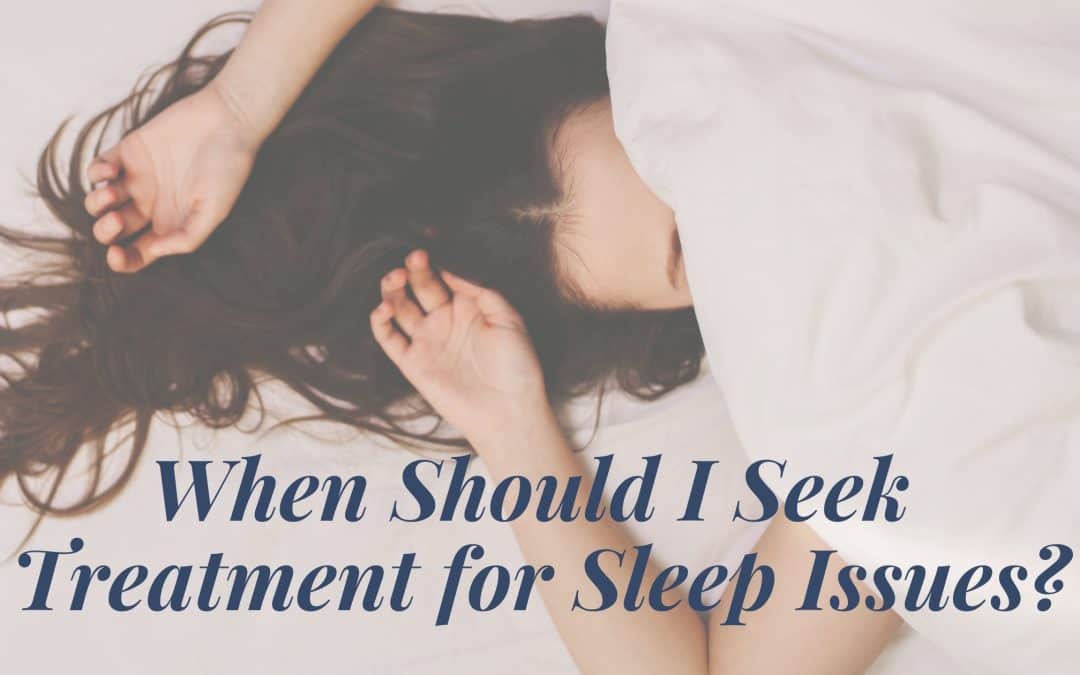Sleep is integral to overall health and wellness. Quality sleep allows the body to rest, heal, and replenish, which is necessary for properly functioning its systems. Obtaining enough sleep is crucial as it will enable the body to sustain itself, providing us the energy to navigate daily life. Adults need 7 to 9 hours of sleep each night, which millions do not receive.
According to the National Sleep Foundation, 35% of adults sleep less than 7 hours per night. We are all likely familiar with the impact of lack of sleep: excessive tiredness, irritability, difficulty concentrating, etc. However, sleep quality is also crucial for overall physical and mental health. However, inconsistent sleep can also produce long-term effects on overall health by causing the development of sleep disorders. Awareness of the signs of sleep issues and addressing symptoms early is essential!
Signs of Sleep Disorders
You should seek treatment for sleep issues if you have experienced any of the following signs:
- consistent trouble falling asleep
- you don’t often stay asleep and/or wake up earlier than anticipated
- feeling tired upon waking up (compared to feeling rested and refreshed)
- needing to take naps during the day
- experiencing fatigue and daytime sleepiness throughout the day
- completing tasks and performing basic activities throughout the day is more challenging
- difficulty focusing
- falling asleep while watching TV, reading, listening to audio, etc.
- your partner tells you that during your sleep you snore, make abnormal movements, gasp for air, or do anything else that seems unusual
- chronic insomnia, characterized by persistent difficulties in falling or staying asleep, with symptoms occurring at least three times weekly for a minimum of three months
According to the Sleep Foundation, if you experience any of these symptoms “more than one night a week for multiple weeks,” you should consult your doctor.
Seeking Treatment: How to Prepare & What to Expect from a Sleep Study
After scheduling an appointment to discuss your sleep experiences, there are helpful ways you can best prepare for the appointment. Two valuable ways that you can prepare and also maximize your appointment is by:
-
- Keeping a Sleep Journal: in the weeks leading up to your appointment, tracking your sleep patterns would be incredibly beneficial. This includes noting what time you fall asleep, how many times you wake up, how long it takes to fall back asleep if you use the bathroom, how long you sleep each day, how you feel the next day, and any other relevant notes (snoring, movements, etc.). It is also helpful to note any exercise routines or activities you engage in daily as well as any ways that you have already tried to improve your sleep.
- Preparing Questions: it is essential to have your sleep concerns thoroughly addressed. Taking the time to write down your questions is a great way to ensure you receive the information you need.
Bringing your sleep journal and concerns to the appointment will help the doctor thoroughly assess your sleep history. You can expect that the appointment will likely consist of:
-
- Sleep History Assessment: your doctor will ask various questions to help identify and diagnose what could be causing your sleep issues. Questions will likely cover the sleep issues you have been experiencing, for how long, symptoms, when you first noticed, the impact of these sleep issues on daily life, how long it takes you to fall asleep, what time you sleep, how often do you wake up, exercise activities, consumption of caffeine and nicotine, questions about mental health, and disruptions in your sleep-wake cycle, etc.
- Physical Exam: Besides asking questions, your doctor will likely conduct a physical exam – listening to heart rate, inspecting tonsils, neck etc.
- Sleep Study: your doctor may recommend a sleep study or polysomnography to assess your sleep patterns, identify specific sleep issues such as central sleep apnea or insomnia, and determine the severity and nature of sleep disturbances.
The information provided from these assessments will help establish the causes of sleep issues and effective treatment options.
Treatment to Treat Insomnia
Treating sleep issues depend on the underlying cause that is impacting one’s sleep. Common causes of sleep concerns are:
- Sleep disorders: the most common sleep disorders are insomnia and sleep apnea
- Medical conditions: including diabetes, depression, hormonal changes
Risk factors for sleep disorders include certain demographics, such as older adults and women, as well as specific medical conditions and lifestyle choices.
Treatments to treat insomnia include both medications and behavioral therapies.
Sleep specialists recommend self-managed treatment as a first option. This focuses on changing behavior to create better conditions to receive quality sleep – creating a sleep schedule, increasing physical activity, managing stress more effectively, changing diet etc.
- Establishing regular sleep habits is crucial for improving sleep quality and addressing sleep disorders. Techniques like cognitive behavioral therapy can promote better sleep and alleviate insomnia symptoms.
The use of sleep aids should be approached with caution, and it is important to consult a doctor before using herbal and dietary sleep aids, as many available without a prescription can have adverse side effects, particularly for older adults.
If these strategies are not effective, we’re here to help! Contact us today to learn more about our sleep services.

